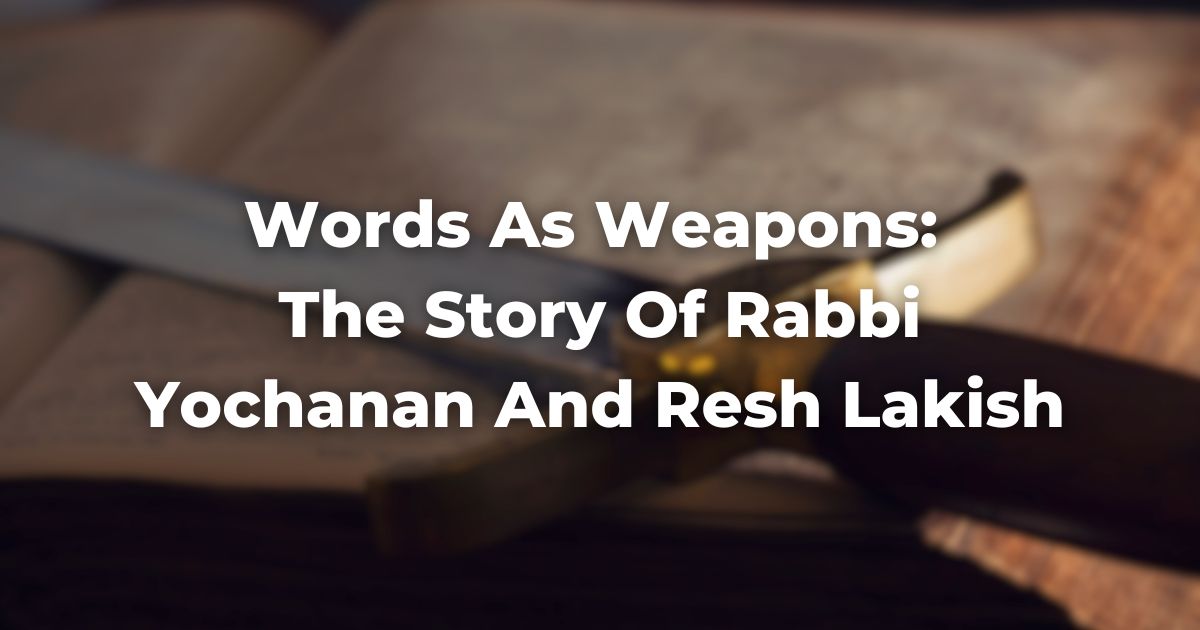Rabbi Yochanan and Rabbi Shimon ben Lakish (“Resh” Lakish for short) were colleagues, brothers-in-law, friends, and fatal enemies.
They lived and taught in the land of Israel in the third century CE, mostly in the Northern Galilee. They are mentioned together in Talmudic literature numerous times as TorahRefers to the first five books of the Hebrew Bible, the Tanakh, also called the Five Books of Moses, Pentateuch or the Hebrew equivalent, Humash. This is also called the Written Torah. The term may also refer to teachings that expound on Jewish tradition. Read more study partners, discussing and often disagreeing on matters of Jewish law and theology.
According to Talmudic legend, Resh left the world of Torah study, becoming a gladiator and a thief due to his extreme poverty. During a chance encounter, Yochanan convinced Resh to return to a life of Torah study and religious observance, taught him Torah, and married off his sister to him. With his help, Resh Lakish eventually became Yochanan’s equal in renowned scholarship and spiritual leadership. (Bava Metzia 84a)
For all their closeness, these two rabbis’ relationship – and both their lives – ended tragically due to a war of words that took place between them. The TalmudReferring to one of two collections, the Jerusalem and Babylonian Talmuds, edited in the 6th century, that contains hundreds of years of commentary, discussion, and exploration of the ideas in the Mishnah. One could describe it as Mishnah + Gemara = Talmud Read more, Bava Metzia 84a, relates that one day, Yochanan, Resh, and the other sages were sitting in the study house arguing about matters of Jewish law.
The topic for discussion was at what stage of their production weapons of war are subject to the laws of ritual purity and impurity. Resh disagreed with Yochanan’s opinion, whereupon the following happened:
Rabbi Yochanan said to Resh Lakish: A thief knows his trade of thievery. Resh Lakish said to Rabbi Yoḥanan: What benefit did you provide me by bringing me close to Torah? There, among the thieves, they called me: Leader of the thieves, and here, too, they (meaning you) call me: Leader of the thieves. Rabbi Yochanan said to him: I provided benefit to you, as I brought you close to God, under the wings of the Divine Presence.
Whether out of malice or cluelessness, Yochanan reminded Resh of his sordid, criminal past. Essentially, he told him, “You more than anyone else would know about the rules concerning weapons production. After all, you were a weapon-wielding criminal in the past,” hardly a compliment for his colleague.
Whatever Yochanan’s intentions were, they became irrelevant the moment Resh responded as the insulted party: “If you’re going to throw my past in my face – especially in front of our colleagues – maybe it would have been better if you hadn’t brought me back to Judaism. Maybe you should have let me remain among the criminals, where I was also respected as a leader!”
The story continues:
As a result of the quarrel, Rabbi Yochanan was offended, which in turn affected Reish Lakish, who fell ill… Ultimately, Rabbi Shimon ben Lakish, Reish Lakish, died. Rabbi Yoḥanan was sorely pained over losing him…Rabbi Yochanan went around, rending his clothing, weeping and saying: Where are you, son of Lakish? Where are you, son of Lakish? Rabbi Yochanan screamed until his mind was taken from him, i.e., he went insane. The Rabbis prayed and requested for God to have mercy on him and take his soul, and Rabbi Yochanan died.
We need to know some of Yochanan’s backstory to understand fully what happened here. He was well known in the Talmud for being a healer (Berakhot 5b) and for causing people to “magically” die when he was insulted or angry with them. (Bava Kamma 117a and Sanhedrin 99b-100a).
However, the students and colleagues who died from his hypersensitivity were not Resh Lakish, with whom he had a close, if complicated, relationship. Yochanan, whose gaze and emotions kill others, was now bereft of his best friend and dear family, so he too died, the victim of his own rage.
The subject matter which touched off the fatal fight between Yochanan and Resh Lakish – when weaponry becomes subject to tum’ah or ritual impurity – is significant. As their intellectual battle about this arcane ritual matter got personal and nasty, it exposed how their use of their tongues as weapons of verbal violence would destroy them.
This is implicit in the ambiguous tone of Yochanan’s response to Resh’s opinions to which I alluded above. It could be read as Yochanan’s innocence or insensitivity (“Resh, I’m merely conceding to your expertise in the matter of weapons production, given your background”) but can just as easily be read as his malicious sarcasm and attempt at humiliation. (“Of course, you would know about such things given where you come from!”)
I suggest that the Talmud makes the intent of his comment ambiguous to emphasize how easily words and their tones become weapons when heated disagreement slips from civility into personal invective. At this point, readers would hope that a great rabbi like Yochanan would deescalate this standoff with an apology to Resh. Instead, he responded with even greater hurt feelings, basically accusing Resh, “You’re an ingrate! I did no less than bring you back to God!”
As we saw above, In our tale, Yochanan’s hurt feelings toward Resh caused Resh to become deathly ill. At one point in our story, Resh’s wife, Yochanan’s sister, begged her brother, the renowned prayer healer, to restore Resh to health, but he callously refused. To paraphrase the theologian Henri Nouwen, who writes about spiritual leaders as wounded healers, Yochanan became a wounding healer. Yochanan’s distress and grief at Resh’s death was doubly tragic. He lost his beloved Resh due to his own horrible behavior, and that behavior was completely avoidable.
This tragic Talmudic account stands in stark contrast with Yochanan’s famously exaggerative teaching about the evils of public humiliation:
It is better for a person to cast himself into a fiery furnace, than to humiliate another in public. (Bava Metzia 59a)
Reading our story and this teaching together, we witness how little Yochanan was able to practice what he preached. Caught up in fierce debate that became personalized, Yochanan needed to save face and to lash out when challenged by Resh Lakish. He chose to consign him to the flames of public humiliation, using his sharp tongue and barbed words as pokers. This story exemplifies how our rabbinic sages don’t tell us to avoid using our words as fatal weapons. They show us through great storytelling what happens when we fail to do so.
Author
-

Dan Ornstein is the rabbi of Congregation Ohav Shalom, a writer and a teacher living with his family in Albany, New York. He is the author of Cain v Abel: A Jewish Courtroom Drama (Jewish Publication Society, 2020). Check out his website at www.danornstein.com
View all posts






